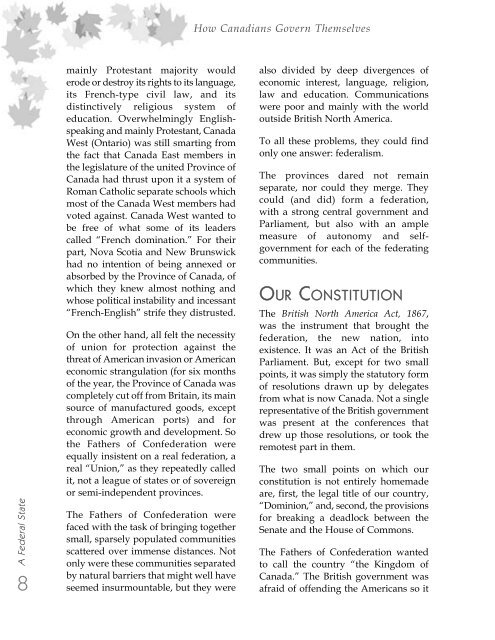How Canadians Govern Themselves - Parlement du Canada
How Canadians Govern Themselves - Parlement du Canada
How Canadians Govern Themselves - Parlement du Canada
Create successful ePaper yourself
Turn your PDF publications into a flip-book with our unique Google optimized e-Paper software.
<strong>How</strong> <strong>Canadians</strong> <strong>Govern</strong> <strong>Themselves</strong>8A Federal Statemainly Protestant majority woulderode or destroy its rights to its language,its French-type civil law, and itsdistinctively religious system ofe<strong>du</strong>cation. Overwhelmingly Englishspeakingand mainly Protestant, <strong>Canada</strong>West (Ontario) was still smarting fromthe fact that <strong>Canada</strong> East members inthe legislature of the united Province of<strong>Canada</strong> had thrust upon it a system ofRoman Catholic separate schools whichmost of the <strong>Canada</strong> West members hadvoted against. <strong>Canada</strong> West wanted tobe free of what some of its leaderscalled “French domination.” For theirpart, Nova Scotia and New Brunswickhad no intention of being annexed orabsorbed by the Province of <strong>Canada</strong>, ofwhich they knew almost nothing andwhose political instability and incessant“French-English” strife they distrusted.On the other hand, all felt the necessityof union for protection against thethreat of American invasion or Americaneconomic strangulation (for six monthsof the year, the Province of <strong>Canada</strong> wascompletely cut off from Britain, its mainsource of manufactured goods, exceptthrough American ports) and foreconomic growth and development. Sothe Fathers of Confederation wereequally insistent on a real federation, areal “Union,” as they repeatedly calledit, not a league of states or of sovereignor semi-independent provinces.The Fathers of Confederation werefaced with the task of bringing togethersmall, sparsely populated communitiesscattered over immense distances. Notonly were these communities separatedby natural barriers that might well haveseemed insurmountable, but they werealso divided by deep divergences ofeconomic interest, language, religion,law and e<strong>du</strong>cation. Communicationswere poor and mainly with the worldoutside British North America.To all these problems, they could findonly one answer: federalism.The provinces dared not remainseparate, nor could they merge. Theycould (and did) form a federation,with a strong central government andParliament, but also with an amplemeasure of autonomy and selfgovernmentfor each of the federatingcommunities.OUR CONSTITUTIONThe British North America Act, 1867,was the instrument that brought thefederation, the new nation, intoexistence. It was an Act of the BritishParliament. But, except for two smallpoints, it was simply the statutory formof resolutions drawn up by delegatesfrom what is now <strong>Canada</strong>. Not a singlerepresentative of the British governmentwas present at the conferences thatdrew up those resolutions, or took theremotest part in them.The two small points on which ourconstitution is not entirely homemadeare, first, the legal title of our country,“Dominion,” and, second, the provisionsfor breaking a deadlock between theSenate and the House of Commons.The Fathers of Confederation wantedto call the country “the Kingdom of<strong>Canada</strong>.” The British government wasafraid of offending the Americans so it




